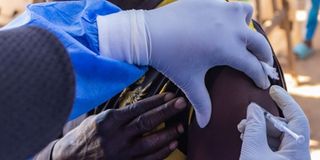Vaccines save over 51 million lives in Africa over 50 years

What you need to know:
- The findings come as part of the assessment of the Expanded Programme on Immunization (EPI)
Iringa. A recent report by the World Health Organization (WHO) says an estimated 51.2 million lives across the African region have been saved over the past half-century through vaccination efforts.
The findings come as part of the assessment of the Expanded Programme on Immunization (EPI), a WHO initiative launched in 1974 with the goal of ensuring equitable access to life-saving vaccines for children across all demographics, irrespective of their geographic location or socioeconomic status.
Released at the commencement of this year's African Vaccination Week and World Immunization Week, observed from April 24th to 30th under the theme "Safeguarding Our Future: Humanly Possible," the report underscores the monumental progress achieved through vaccination programs in the region.
With unwavering support from organizations like WHO, UNICEF, Gavi, the Vaccine Alliance, and numerous others, most countries in Africa now offer vaccines against 13 vaccine-preventable diseases, up from the initial six when the EPI was launched.
Significant milestones include a notable reduction in measles-related deaths, with an estimated 19.5 million deaths averted over the last 22 years. Additionally, there has been a remarkable decline in meningitis deaths, down by up to 39% in 2019 compared to 2000.
Furthermore, the African region achieved a historic milestone in 2022 when it was declared free of indigenous wild poliovirus, following years of concerted efforts to protect children from the virus.
WHO Regional Director for Africa, Dr Matshidiso Moeti, emphasized the pivotal role of vaccines in disease prevention and eradication, stating, "From disease prevention to eradication, the success story of vaccines is a compelling one. Millions of people are alive and healthy today thanks to the protection vaccines offer."
The introduction of new vaccines, such as the first-ever malaria vaccine, and the expansion of existing ones, like the Human Papillomavirus (HPV) vaccine, which guards against cervical cancer, herald a promising future for generations to come in Africa.
UNICEF Regional Directors for Eastern and Southern Africa and West and Central Africa, Etleva Kadilli and Gilles Fagninou respectively, underscored the importance of sustaining immunization gains in the face of recent setbacks.
Efforts to address challenges in vaccine coverage and equitable access are ongoing, particularly in the aftermath of disruptions caused by the Covid-19 pandemic. While progress has been made, gaps persist, prompting intensified initiatives such as the "Big Catch-Up" campaign and the Zero-Dose Immunization Programme to reach underserved communities.
Looking ahead, the region aims to accelerate progress towards the goals of Immunization Agenda 2030, endorsed during the WHO World Health Assembly in 2020. Key strategies include strengthening health systems, addressing vaccine hesitancy, bolstering surveillance systems, and increasing domestic funding for immunization programs.
As Africa continues its journey towards improved vaccine coverage and access, sustained collaboration and investment in immunization efforts remain imperative to ensure a safer and healthier future for all.





